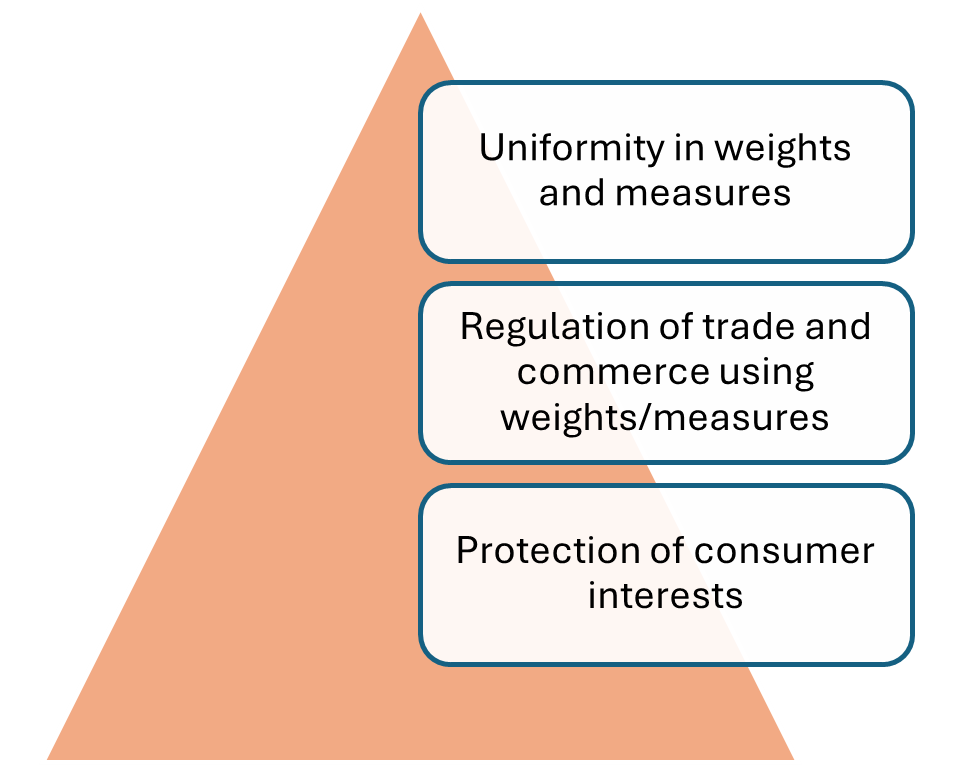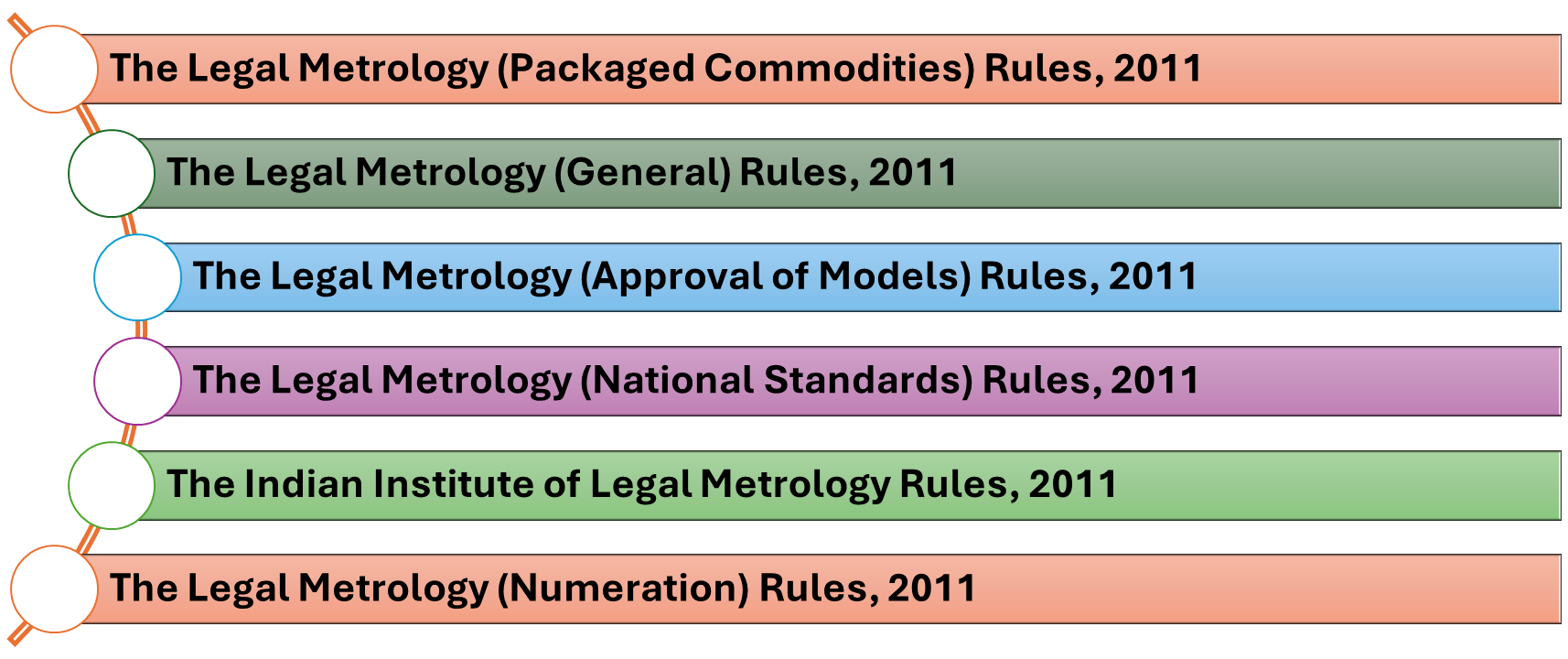Legal Metrology encompasses all legal requirements related to measurements and measuring instruments, ensuring public trust in trade, health, safety, and environmental protection. As per Section 2(g) of the Legal Metrology Act, 2009, Legal Metrology addresses units of measurement, methods of measurement, and instruments used, ensuring their conformity with mandatory technical and legal standards.
Evolution of Legal Metrology in India
The journey towards standardized measurement systems in India began with the establishment of the Weights and Measures Organization in 1958. Over the years, several legislative measures were introduced:
Acknowledging the necessity for modernization and harmonization with global standards, the Legal Metrology Act, 2009 was introduced, replacing earlier legislation to create a more streamlined and contemporary regulatory framework. The Act came into force on April 1, 2011, with the objective of simplifying regulations and enhancing consumer protection.
Applicability
Main Objectives:

Major Provisions Include:
- Regulation of weights and measures in trade and protection-related transactions
- Model approval for manufacturing/import of measuring devices
- Verification by Government Approved Test Centres (GATC)
- Mandatory licensing for the manufacture, sale, or repair of weights and measures.
- Declaration requirements on pre-packaged commodities
- Penalty provisions for offences and compounding options
- Nomination of responsible officers in companies
- Appeals process against orders of legal metrology officers
Supporting Legislations and Rules

Licensing and Verification Provisions
- Model Approval: Required for most weights and measures (except specific items like iron weights or measuring tapes).
- Licensing: Mandatory for anyone manufacturing, selling, or repairing weights and measures.
- Verification: All weights/measures must be verified before use in transactions.
- Record Keeping: Licensees must maintain and present records during inspections.
Offences, Penalties, and Appeals
- Certain offences are compoundable (settled by paying a fine), provided no repeat offence occurred within three years.
- Companies must nominate a responsible person for legal compliance. In absence, top management is held liable.
- Appeals can be made within 60 days to the next higher authority.
Courts may also direct convicted companies to publish their offence details in newspapers.
Recent Amendments and Developments
-
Jan Vishwas (Amendment of Provisions) Act, 2023
In October 2023, the Jan Vishwas Act introduced significant changes to the Legal Metrology Act:
- Enhanced Penalties: Increased fines for violations. For instance, the penalty for using non-standard weights or measures was raised to ₹1 lakh for the first offence, ₹2 lakh for the second, and up to ₹5 lakh for subsequent offences.
- Decriminalization: Replaced imprisonment provisions with monetary penalties for certain offences, aiming to reduce the burden on courts and promote ease of doing business.
These amendments came into effect on October 1, 2023.
-
Legal Metrology (Government Approved Test Centre) Amendment Rules, 2025
In January 2025, the Ministry of Consumer Affairs notified amendments to the Legal Metrology (Government Approved Test Centre) Rules, 2013:
- Expanded Scope: Included additional instruments like water meters, clinical thermometers, and energy meters for verification.
- Revised Fee Structure: Introduced a new fee schedule for verification services, varying based on the type of instrument and its application.
- Inspection Procedures: Established mandatory joint inspections by central and state authorities before granting recognition to test centres
-
Draft Legal Metrology (Indian Standard Time) Rules, 2025
In January 2025, the Ministry released draft rules to standardize the use of Indian Standard Time (IST):
- Mandatory Use of IST: Requires all official and commercial activities to adhere to IST
- Custodianship: Designated the CSIR-National Physical Laboratory as the custodian of IST
- Penalties: Proposed penalties for non-compliance, with allowances for specific deviations under authorized circumstances.
-
Draft Legal Metrology (Packaged Commodities) Amendment Rules, 2025
In February 2025, the Ministry of Consumer Affairs introduced amendments to the Legal Metrology (Packaged Commodities) Rules, 2011, focusing specifically on the packaging regulations applicable to medical devices:
- Alignment with Medical Devices Rules: Allows declarations on medical device packages to comply with the Medical Devices Rules, 2017, including flexibility in the placement, font size, and format of declarations.
- Regulatory Clarity: Clarifies that relaxations are permitted only to the extent necessary for making accurate and compliant declarations under the existing rules
-
National Legal Metrology Portal (eMaap)
To facilitate compliance and enforcement, the Department of Consumer Affairs is developing the National Legal Metrology Portal (eMaap):
- Centralized Database: Integrates state legal metrology departments into a unified national system.
- Simplified Processes: Streamlines procedures for issuing licenses, conducting verifications, and managing enforcement activities.
- Data-Driven Decision Making: Enables policy formulation based on comprehensive data analysis.
Disclaimer
The information provided in this article is intended for general informational purposes only and should not be construed as legal advice. The content of this article is not intended to create and receipt of it does not constitute any relationship. Readers should not act upon this information without seeking professional legal counsel.



